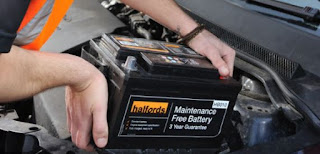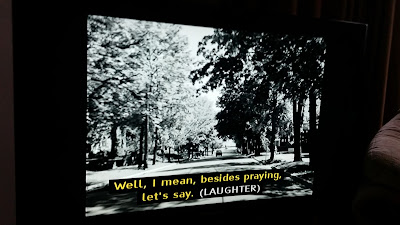10:00 Lois rings the local pharmacy to see if they're delivering our statins today - they say yes, but when they arrive at about 2 pm, we discover they've only sent Lois's. We ring them up again and mine come eventually about 4 pm. The pharmacist explains on the phone that my pills must have got stuck somewhere in the bottom of his box. What madness!!
10:15 I look at social media on my smartphone and I see a charming picture of my sister Gill in Cambridge with her youngest daughter Lucy, in Cambridge Botanical Gardens.
my sister Gill, with her daughter Lucy, in Cambridge Botanical Gardens this week
10:30 I go out front and try the car to see if it starts - the battery was charged up by a breakdown guy on Tuesday, but I don't trust it - oh dear! But it starts fine, and I stay sitting in it for 20 minutes while I run the engine: although I honestly don't know if this helps to keep the battery ticking over or not.
The breakdown guy told me on Tuesday that the battery had seen better days - it's the original one that came with the car when it was new, in 2012. And Steve, my American brother-in-law, tells me that in the States they reckon a US-made car battery is only good for 5-7 years on average, and that theirs in the States are likely to be more durable than ours, because of the greater extremes of temperature they get over there.
I decide to get the battery replaced, and ring Halfords. They have a really good online system. You put in your car registration number and they know what make and model it is, and they suggest a choice of suitable batteries. You can buy one online and book a slot for one of their installers to come round and install it. I pick the cheapest slot they've got, which is 8 am to 8 pm this coming Saturday, at only £2. It's a bit inconvenient to opt for a 12-hour slot, but the other slots are much more expensive: I'm such a cheapskate haha!
Simples - sorted !
Winter is coming, and I recently read some really useful and practical hints on caring for your car on the influential American news website, Onion News.
I know about a lot of these tips already, but I'm congenitally lazy I'm afraid. Nevertheless I solemnly vow to really follow their advice this year!
Regular maintenance will
make your automobile safer to dive and extend the life of your vehicle, saving
you money in the long run. Here are some tips to help keep your car in tip-top
shape:
1. Always drive with all four wheels.
2. Oil is a
non-renewable resource that's bad for the environment when wasted. Drive your
car until it is completely out before adding more.
3. Bungee-cord your front bumper to your neighbour's
rear bumper to save on gas and engine wear. Keep insisting it's a coincidence
that you're going the same place. If he or she asks where you are going next,
say you haven't decided yet.
4. Use a high-pressure hose to periodically spray
slippery, dangerous vomit off floormats.
5. Find a mechanic who takes the time to change your
car's velocity-extension belt and Jupiter rings, which many mechanics often
overlook.
6. To extend the life of your car battery, keep it in
the refrigerator when not in use.
7. In times of engine trouble, putting your fist
through the dashboard probably won't fix your car's malfunction, but it will let your car know how you feel.
8. To prevent skidding, place flower-shaped anti-skid
stick-ons everywhere you will be driving.
9. Good, responsive brakes are crucial. Be sure to
clear out the heap of Egg McMuffin wrappers from under your brake pedal so you can push it all the
way down to the floor.
Some excellent advice there, that's for sure! And for somebody like me, who basically doesn't understand cars and how they work, they're real nuggets worth their weight in gold, no doubt about that!
18:00 We have dinner - Bristol's own "Nick the Fishman"'s jumbo fish fingers, which are about 6 inches long: yum yum! Plus potato and broccoli. With a Parsley Box apple and rhubarb crumble for dessert - yum yum again!
flashback to Wednesday October 21st, when we try Nick's "jumbos" for the first time
the apple and rhubarb crumble we have for dessert tonight
Over dinner, we discuss an email from Steve, our brother-in-law in Pennsylvania USA. Yesterday Lois and I read a reader's letter in our copy of "The Week" magazine, which gives a digest of the week's news from around the world.
The letter had said that Joe Biden may have owed his success
to Jo Jorgensen, the third party Libertarian Party candidate. Had Jorgensen not been
running, and her votes been cast instead for Donald Trump, then Trump would
have won, according to the writer, because in almost all the key swing states, the total of her votes
were more than Biden's margin of victory.
Steve, who knows at least one libertarian voter personally, says he believes that most of these voters voted that way because they wanted to cast their vote (If you don't vote, then you can't bitch, as Steve says!), but they didn't want to vote for either Trump or Biden, So none of those votes would have closed the vote gap in any of the swing states that Trump lost.
Fair enough!
20:00 We watch a bit of TV, an interesting documentary - first part of a series of 3 - on the Great Plague of 1665.
The Great Bubonic Plague of 1665 is reckoned to have killed about 100,000 people in London, and about the same number outside the capital. The received wisdom until relatively recently was that it was brought to Britain by rats and rats' fleas, travelling by ship from the Continent (although it's thought that they didn't pay for their passage - the cheapskates!!!).
However, suspiciously, the plague in London didn't begin in the city's port area, which would have been the natural starting point if it had arrived with the rats - in fact the first outbreaks were reported in the poor slum district of St Giles-in-the-Fields, which was well outside the old city walls. Even today nobody knows exactly why it started in St Giles, but it's easy to see why it spread quickly in that area, because of the poor, crowded living conditions that were prevalent at the time.
So if it wasn't the rats spreading it, what were the culprits? Researchers studying a later outbreak of Bubonic Plague, in Marseilles in 1720, have identified body lice, together with human fleas, as the most likely agents. Body lice like to live in the clothes that are next to your skin - it's the equivalent of having a fridge in your living-room: the lice can relax in the warmth of your clothes and take a bite of your blood when they feel hungry: simples!
The residents of the slums of London's St Giles-in-the-Fields would have lived crowded in cramped dwellings, sleeping on straw mattresses - also popular with human fleas, with large families with scads of children all sleeping together for warmth, in their underclothes, on sheets that were rarely washed - yikes!
The poor areas outside the city walls predictably suffered the most deaths. In the richer areas, inside the walls, anybody who could afford to move out into the country did so, including most of the doctors - the creeps!!!!
most deaths in the 1665 plague happened in the poor areas outside the city walls
Interestingly, there was also a much later outbreak of Bubonic Plague in the Gorbals, a slum district of Glasgow, around 1900, the tail-end of a more general outbreak in the 1880's. This mini-plague spread rapidly locally due to the practice of holding wakes round a dead body: the body was typically displayed on a bed in the middle of the room: mourners would come to pay their respects, actually kissing the body and taking back lice and fleas from the body and from the bed to their own homes - my god! Researchers have again found no evidence that rats were a factor in the spreading of the disease - rats found were identified as having been plague-free.
Oh dear!
21:00 We want to go to bed on a lighter note so we watch the latest in Barry Cryer's series on Comedy Legends: this one is about Bob Newhart.
We didn't realise that Bob Newhart "almost literally" [Don't use that hopelessly inaccurate phrase! - Ed] rocketed to stardom in the early 1960's. He had made a hobby out of entertaining his friends with his little routines: however, as soon as he started doing it professionally he quickly became famous all over the English-speaking world.
His was quite an achievement because he was virtually inventing a new comedy genre, not easy in such a crowded field: i.e. the genre of the conversation or the phone-call that you are only hearing one side of.
I remember that at that time, people didn't always just go out and buy records that they liked. They just wrote in to radio request programmes, asking for them to be played on the air. Bob Newhart's routines, especially his "phone call to Sir Walter Raleigh in the colonies" and "The Driving Instructor" were the ones that we used to hear most frequently requested on the radio.
22:00 We go to bed - zzzzzzz!!!!!





















No comments:
Post a Comment